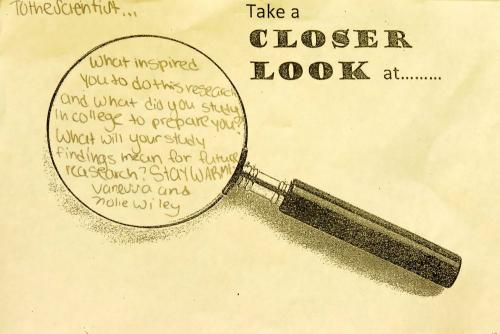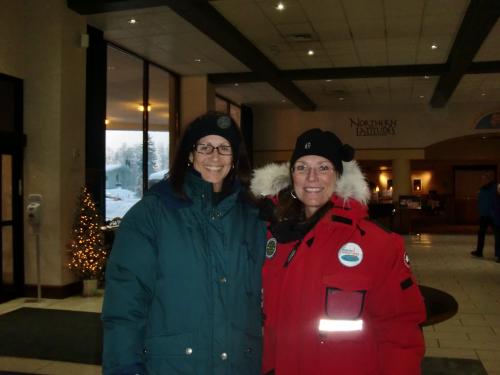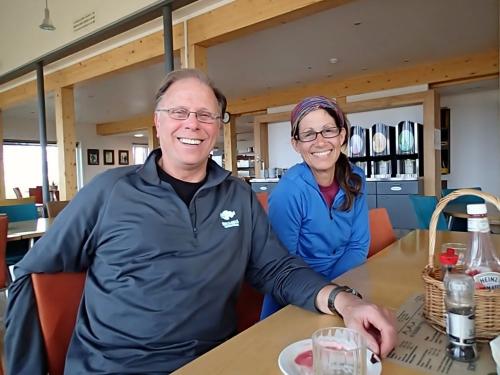"I think it's much more interesting to live not knowing than to have answers which might be wrong.” ― Richard P. Feynman
The above quote comes from my favorite scientist, Richard Feynman. I love it because it encapsulates what science is. Science is about NOT knowing. If we had all the answers, then all the scientists could pack up and go home. But there are so many things unanswered and that gives us opportunities for asking questions and trying to figure things out. Life is enriched by a sense of curiosity and wonder.
So today I bring you a "Take A Closer Look" question from Vanessa and Nolie from Girl Scouts that is directed to our lead scientists, Dr. Julie Brigham-Grette and Dr. Ross Powell. They ask, "What inspired you to do this research and what did you study in college to prepare you? What will your study findings mean for future research? Stay warm!"
 A question to the scientist
A question to the scientist
First, introductions are in order.
Dr. Julie Brigham-Grette is a professor of Quaternary/Glacial Geology and Arctic Paleoenvironments at the University of Massachusetts , Amherst. Her research interests are focused on the stratigraphy, sedimentology, and chronology of geologic systems that record the climate evolution and sea level history of the Arctic since the mid-Pliocene. She is the US Chief Scientist of the El’gygytgyn Lake Scientific Drilling project which recovered a 3.6 million year record of paleoclimate from the terrestrial Arctic.
 Me with Julie in Fairbanks, Alaska
Me with Julie in Fairbanks, Alaska
Dr. Ross Powell is a professor of sedimentology and climate change at Northern Illinois University. His research interests include evaluating processes at and near marine-ending glaciers in Alaska, Chile and Antarctica. Dr. Powell was one of the Co-Chief Scientists for the ANDRILL MIS (McMurdo Ice Shelf) Project in Antarctica.
 Me with Ross in the dining hall, Ny Alesund
Me with Ross in the dining hall, Ny Alesund
It is such a pleasure to work with both Julie and Ross because of their deep knowledge of the polar regions, their experience and because they are just all round great people.
So, here are their answers.
(From Dr. Julie Brigham-Grette)
Dear Vanessa and Nolie,
I have been inspired by the beauty of the Arctic for many years but I was particularly fascinated by the sensitivity of the Svalbard region to global climate change. Here we can easily study glacier retreat and the processes impacting the rates within the natural setting of Ny Alesund as part of any international effort. I like working in science probably because of family summer vacations camping in national parks and I really love field work. So being a geology major in college was a natural. Then I did a Ms and PhD in the Arctic that led me to new questions. Science is an adventure and I love the sense of discovery. This is what inspires me. Our present work will help scientists understand how sensitive glaciers are to climate change and we should be concerned about the collective impact of melting glaciers on global sea level rise. thanks...Julie BG
(From Dr. Ross Powell)
G'day Vanessa and Nolie
I grew up in New Zealand and did a lot of tramping (hiking) through the NZ bush and mountains when I was in high school. That led me to thinking about how mountains and the rocks and landscape get made. So at university I started to study geology and REALLY enjoyed it, and so studied geology and related sciences for my BS. As I progressed I was lucky to take my first expedition to Antarctica for my MS and I was so captivated by the place, the experience and the science, I wanted to make it a career. So I have working in in the Arctic and Antarctica my whole career and due to global warming I have seen vast amounts of changes. Understanding that humans are causing those changes motivates me even more into wanting to continue this research and also educate students about the issues and let them see it for themselves. I hope our studies provide a valuable piece of information to help understand global warming better. We hope to carry-on our research in the future to continue helping to understand the impacts of global warming.
Ross Powell
I'll leave you with another quote from Richard Feynman: “Nobody ever figures out what life is all about, and it doesn't matter. Explore the world. Nearly everything is really interesting if you go into it deeply enough.”


Comments